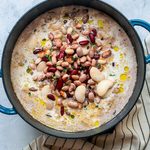Jillian Michaels Hates This Diet Trend
Plus, how she thinks you *should* be eating.

Despite what you’ve heard, the Ketogenic (Keto) diet is not new. It is, however, a new diet trend. According to experts, the Keto diet was first developed to treat patients with epilepsy and it’s not the cure-all, weight-loss miracle it’s currently made out to be. It’s highly restrictive and involves cutting out large groups of foods while eating excessive amounts of fat. And according to fitness expert and best-selling author Jillian Michaels, it has massive downsides, including the fact that it’s not a sustainable or particularly enjoyable way of eating. It’s an ultra-low-carb diet, which can affect your energy levels and potentially your brain growth, according to a study published in Chicago University’s Quarterly Review of Biology. “If you’re doing it because you think you have to, you absolutely don’t,” says Michaels. “There’s a far healthier and more balanced way, and it’s called a balanced, calorie-controlled diet where you don’t eat processed foods and you workout.”
(Get moving with this 7-minute circuit workout from Jillian.)
For some of the same reasons, Michaels also isn’t a fan of the Paleo Diet. “I don’t even know what that is. I have to be honest, I’ve read 50 different versions of it,” she told us. “It’s all over the place and there’s zero logic to it. And the concept that Palaeolithic man ate this way has also been proven false.” Michaels says Palaeothithic man actually ate a lot of bark, berries and natural grasses. New research has also challenged the concept of the Paleo diet, suggesting that early humans did consume carbs. A smarter way to do a Paleo-style diet would be to eat mostly plants, clean meats, and avoid processed grains, says Michaels.
One style of eating that Michaels does have positive things to say about is intermittent fasting. But not for the reason you might think. According to Michaels, intermittent fasting is most beneficial for anti-aging, as opposed to weight loss. “Because you have less oxidative stress on the system and you’re giving your body a period of time where it doesn’t have to worry or designate its energy to breaking down food, [your body] can take time to break down those senescent cells, called zombie cells, which can lead to disease,” she says.
Now, there is some confusion about what exactly fasting means in the context of intermittent fasting. It’s a period where you’re not eating; it doesn’t mean starvation. Michaels says that a restricted diet of just 500 calories per day is a bad idea. Instead you should be eating a regular, calorie-controlled diet, where your eating is restricted to a specific time period. The most popular approach is the 16/8, which requires fasting for 16 hours a day. So, all meals would be eaten between 11 a.m. and 6 p.m. followed by a 16-hour fasting period from 6 p.m. to 11 a.m.
(Here’s more on the benefits of intermittent fasting.)
Ultimately, you should enjoy eating. You’ll never be able to stick with a diet that you hate. Instead, eat healthy most of the time, while still allowing yourself little indulgences. According to Michaels, the 80/20 diet is the way to go. “You get to indulge every day but you work it in to a framework that’s calorie controlled. So every day, take 20 percent of your allotted calories and you make it foods that are not terrible for you but less than healthy.”
Next, don’t miss what Jillian Michaels thinks about Whole 30, collagen supplements, and more of the latest wellness trends. Plus, find out why Jillian believes your age has nothing to do with how fit you are.




